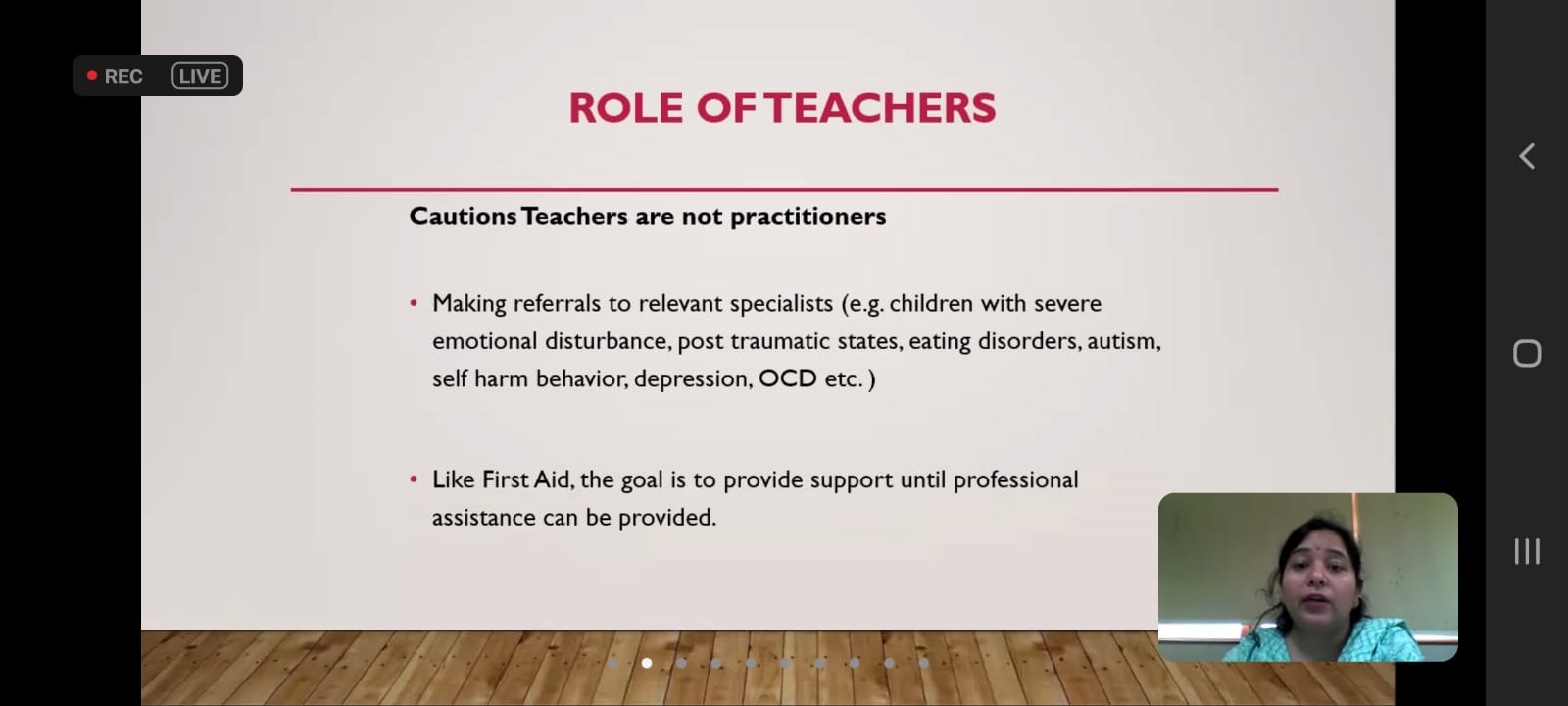Every child is unique and deserves to be listened to, cared for, supported and respected, only then can a bright and mentally healthy generation be nurtured.
Statistics show that 75% of mental illness issues begin before 18 years of age. Therefore, it becomes a huge responsibility for the stakeholders to give special attention to the positive mental health and wellness of students on all levels. Keeping this in mind, Grade 6th to 12th teachers of Rajmata Krishna Kumari Girls’ Public School, Jodhpur, attended an informative webinar organized by AIIMS, Jodhpur on ‘Addressing Psychosocial Issues in School Children’ on the 9th of October, 2021.
The webinar began with Dr Swati Choudhary’s address to the audience and a brief introduction of the common psychosocial issues faced by school students and how can the school help in promoting and strengthening the pupils' well-being. She also mentioned that teachers play an important role in the early identification of the warning signs of psychological problems in children and that it is crucial for teachers to get some basic training to become expert observers and address a few issues at the school level itself.
The discussion continued with Dr Pratibha Gehlawat, Associate Professor of Psychiatry at AIIMS, who spoke about the ‘Identification of Common Mental Health Issues Among School Children’. She said that according to CDC, 2013, “Student mental health issues are characterized as a student experiencing difficulties regulating their mood, thoughts, or behaviours.” She added that with increasing recognition that mental health issues are common in young people, educators are required to act as the first line of prevention. This involves understanding externalizing behaviours i.e. ADHD, Autism Spectrum Disorder, Conduct Disorder, Oppositional Defiant Disorder (ODD), etc. and internalizing behaviours i.e. Depression, Bipolar Affective Disorder, Anxiety Disorders, OCD, etc., exhibited by students who may be struggling with mental health issues. She mentioned that prevention also includes the understanding of behaviours that may not necessarily be problematic to classroom instruction, but ultimately impact student outcomes in school and life beyond the boundaries of school. She, then, discussed the symptomatology of the common types of psychological disorders and behavioural problems that children might experience, in detail. She concluded her presentation with a suggestion for teachers to adopt the habit of using easy Assessment Tools like the Children Behaviour Questionnaire, Classroom Adjustment Rating Scale and AML Behaviour Rating Scale, every quarter to provide in-depth information regarding a child's present problem and challenges.
The Webinar continued with Dr Tanu Gupta’s (Clinical Psychologist, AIIMS) address on the ‘Psychosocial Interventions at School’. She began the presentation by mentioning that schools are well-positioned to fill the gap in mental health service provision and in making the services easily and equally accessible for the youth. She, then, discussed the School-Based Psychosocial Interventions that can be delivered in a school setting and aim at improving students’ behavioural, emotional, or social functioning. These interventions are to be carried out by teachers in the classroom and they include activities, strategies, and techniques that are aimed at improving mental health outcomes, functional impairment, and well-being of students.
According to WHO, the recommended framework of health-promoting schools involves creating a healthy school climate, strengthening the children’s coping skills and promoting and protect the students’ mental health which will then ensure better academic and psychosocial outcomes. The Multi-Tiered System of Support for Students works on 3 levels:
Tier 1: Universal mental health promotion for all students.
Tier 2: Selective services (Support and Early Intervention) for students identified as at risk for a mental health concern or problem.
Tier 3: Targeted Interventions for students with serious concerns that impact daily functioning.
Dr Tanu further added that schools must adopt a ‘Whole School Approach’ that involves everyone (School leaders, counsellors, teachers, staff and parents) to embed a safe and inclusive learning culture and environment as universal approaches are least intrusive, potentially low cost and therefore, have greater appeal. She continued the address by mentioning the ‘Specific Psychosocial and Psycho-Educational Interventions’ that can be taken by the counsellors and teachers to assure optimal positive mental health in their school like Interventions for:
? Anxiety
? Stress management
? Developing Coping Skills
? Problem Solving
? Managing Sadness & Depression
? Anger management
? Managing Behavioural Problems
? Managing a Child with ADHD
? Improving Self-Esteem
? Resilience Building
? Mindfulness
She concluded her presentation by outlining the basic psychosocial skills and role of teachers by saying that “the appropriate role of teachers is not to solve the problems of the student who is experiencing a mental health problem, but instead to observe for symptoms of a mental health issue, listen non judgmentally, provide support in the form of reassurance that will help them get the assistance they need, refer to mental health professionals and to advocate for appropriate services.”
The webinar ended with the spokespersons’ informative and suggestive address of queries put up by some teachers.

